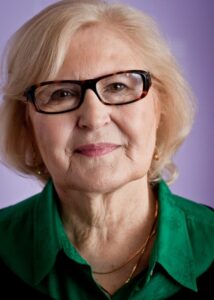By: Pauline Boss, Professor Emeritus of Family Social Science, University of Minnesota
Unanswered questions, uncertainty and the disruption of family and work life due to COVID-19 are causing a pandemic of anxiety and distress.
What can help?
 Pauline Boss, professor emeritus of Family Social Science, says giving it a name is a start.
Pauline Boss, professor emeritus of Family Social Science, says giving it a name is a start.
“What is distressing us is not just the coronavirus, but the ambiguity surrounding it, what it will do, and what we should do about it,” says Boss. “Science provides some answers but we are experiencing uncertainty, and that’s very stressful for a society that is accustomed to solving problems and having definitive answers.”
For over 30 years, Dr. Pauline Boss’ work has focused on the interdisciplinary study of ambiguous loss, defined as loss without resolution. Connecting family science and sociology with family therapy and psychology, Boss has created a road map for mental health professionals to assist their clients in finding meaning and discovering hope in the face of ambiguous losses. The Ambiguous Loss framework has been used by professionals across cultures and disciplines to help individuals cope with losses that remain unclear and without certainty.
“The ambiguous loss framework is useful in situations such as this – full of uncertainty – as therapists and mental health professionals can plug into it their own needs and their client’s needs,” says Boss. ”Theory such as this provides a map, not definitive strategies, and what we need now is a map – this is new territory for us all.”
Pauline Boss, professor emeritus in Family Social Science at the University of Minnesota, is an educator and researcher who is widely recognized for her groundbreaking research on what is now known as the theory of ambiguous loss. Dr. Boss is known as a pioneer in the interdisciplinary study of family stress. For over thirty years, her work has focused on connecting family science and sociology with family therapy and psychology. Her multidisciplinary perspective has allowed her to work as a scientist-practitioner to develop theory that guides practice.
Since 1973, Dr. Boss has studied ambiguous loss, taught university students, practiced as a clinician, and trained family therapists, psychologists, counselors, and humanitarians around the world to help individuals and families suffering from the trauma of ambiguous loss and its grief that has no end. Drawing on research and clinical experience, Dr. Boss worked across cultures to develop six useful and inclusive guidelines for building the resilience needed to both bear the ambiguity and move forward to live productive lives.
Resources on Ambiguous Loss
Dr. Boss’ website: ambiguousloss.com
Improving Lives blog post on Ambiguous Loss
Healing, Loss, Ambiguity and Trauma
Loss, Trauma and Resiliency by Pauline Boss published by WW Norton
Ambiguous Loss online certificate program
This online certificate program gives mental health professionals an opportunity learn at their own pace from Dr. Boss through video and five online modules.
Videos available on the National Council on Family Relations website:
“A Conversation about ambiguous loss theory“ and “Finding meaning to cope with Ambiguous Loss” (video & downloadable slides)
Photo source: Adobe stock















